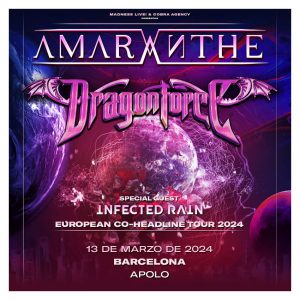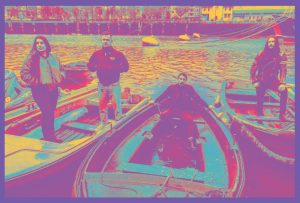MALOKARPATAN (EN)
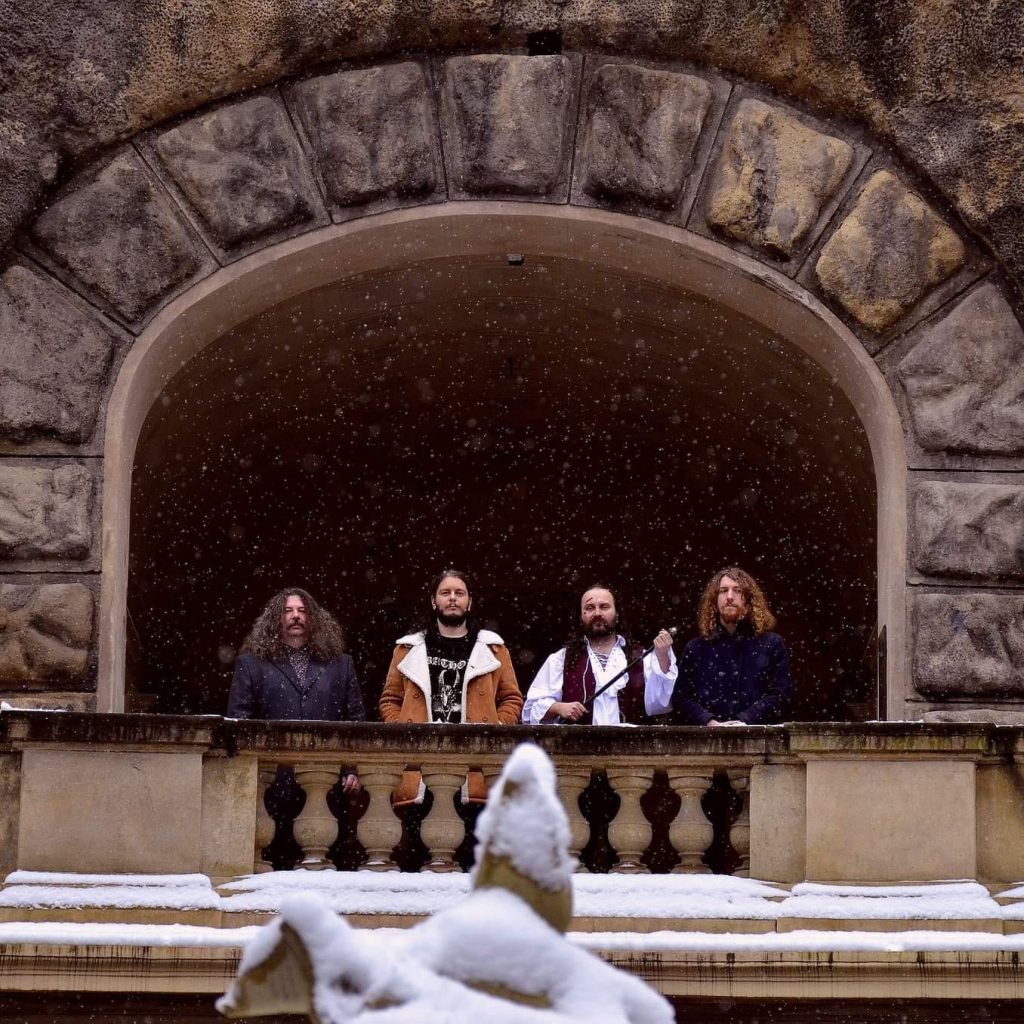
The Slovaks Malokarpatan recently released the majestic ‘Vertumnus Caesar’: one of the best recordings of last year, for a good part of the Queens of Steel team. An atypical mix between heavy and black, with compositions focused on Slavic mythology and occultism. For that reason we wanted to talk to the mind behind this project, guitarist Adam Sičák, with whom we already had the pleasure of talking a few years ago.
1) First of all, I would like to thank you again Adam for the opportunity to interview you. We would like you to explain us what is the idea behind Malokarpatan and what are your biggest musical influences. It’s inevitable to think about the more progressive songs of Mercyful Fate, like ‘Satan’s Fall’
Hey, no problem of course! When starting Malokarpatan ten years ago, the idea was simply to build upon traditions of 80s black metal – from back when the genre hasn’t been yet dumbed down to a specific musical cliché – which happened after the Norwegian style exploded worldwide. I love the Norwegian style just as much as the First wave, but since my own cultural area has a somewhat forgotten tradition of early black metal done in our own way, I wanted to explore the old dusty paths further and go new places. This gives you a ton of creative freedom, because when just thinking of the early primordial black metal like Venom, Mercyful Fate, Kat, Exorcist, Hellhammer, Sarcófago – none of those bands sounded alike each other, they just shared a certain orientation towards the occult and the dark side in their lyrics and imagery. There’s a LOT to be explored there and that’s what we do ever since. I like to reinvent ourselves a bit with each album as stagnation bores me. Lyrically and spiritually, we’ve always been influenced by the ”worlds beyond”, the occult, the paranormal, the strange. On the Folk Horror trilogy of our first three records this was done in a specifically local way, influenced by our regional culture. Since Vertumnus Caesar, I’ve started expanding for new inspirations even though still staying somewhat local, which I’ll explain later. You are very correct about Satan’s Fall, that’s a big inspiration along with other somewhat-progressive parts of First wave style black metal – Venom’s At War with Satan or even Sabbat’s The Dwelling..
2) What is the meaning of your name and how do you think it is reflected in your compositions?
It means an inhabitant of the Small Carpathians (Malé Karpaty in Slovak language) – which is the local mountain range here, so it kinda says literally who we are. I like the name also because there is virtually zero chance someone would use it other than us. There’s a strong mysticism historically attached to the Carpathian mountains and all the different areas of Europe they go through – in Slovakia for example Elizabeth Bathory’s castle is located there. So it’s a name that also reflects all this macabre history of where we come from.
3) That you go for the Slovak language doesn’t go unnoticed, also using a certain archaic vocabulary. I understand that it is due to the local history and mysticism that you want to transmit with your songs. Did you ever think about using English?
Yes, pretty much all the time. Since I don’t even write in standard Slovak language, it makes things extra complicated for me. I use a rather freeform mix of local dialects, historical/archaic language, poetic words etc. Any sort of specific magic this has gets instantly lost in translation, even though I always try to make the best translations possible. So it gives local people an extra layer to the band which they can delve into, but internationally it’s basically a waste of time haha. Well it does add a sort of exotic charm sonically I guess. I always struggle with the thought of shifting to English and there’s a good chance I’ll finally do that on the next album. Thing is, I get even more complications when we’re making album booklets because of the specific Slovak letters used there and when you, like us, work with mostly foreign graphic designers, this all can end in a chaotic clusterfuck since they obviously can’t understand the words. So in short, it creates a specific sort of magic for the songs, but creates more problems than benefits in the end.
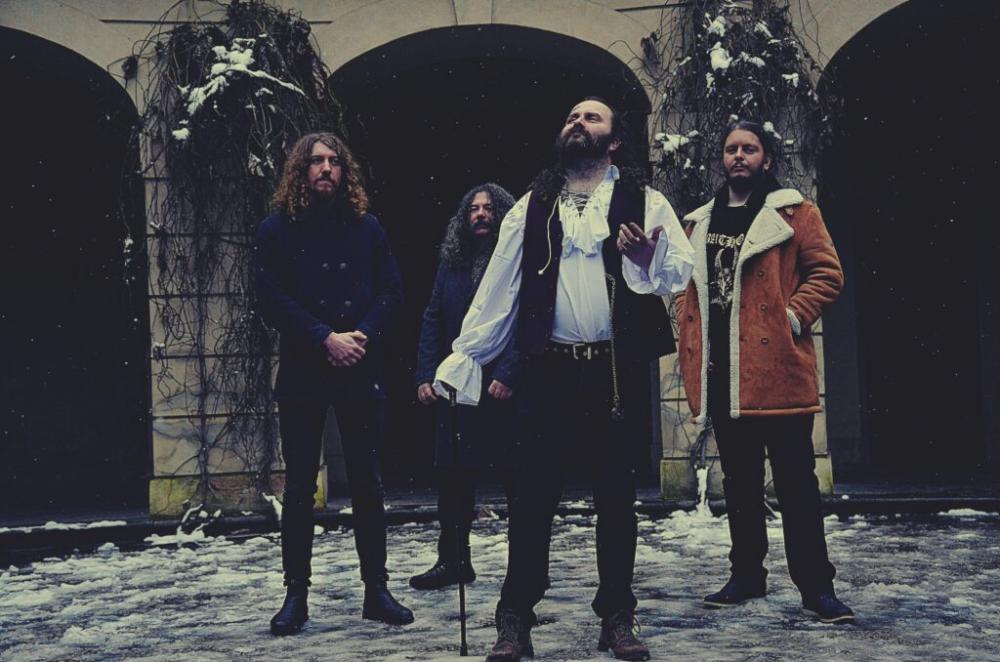
4) In our previous interview, you told us that you felt identified with bands like Chevalier and the Finnish black scene. Surely that’s why you have decided to count in your band with the services of Axel Johansson? Hands of Orlac’s drummer also.
Yeah we might not really play the same style of music as Chevalier, but where I feel an attachment to them is using classic 80s style metal and developing it into an individual vision, without being a direct copycat of the past with no invention. I think the new wave of old school metal bands is fine, but I often miss originality in their work. We kind of even owe it to the old masters to expand on their vision, because what made those records great in the first place was their innovation. Axel has been a fan and friend of the band ever since at least the Nordkarpatenland recording sessions where he was present along with Tommi from Chevalier. After our drummer Miroslav decided to stop playing drums actively, Axel was the first logical choice to ask because we share a great part of our music tastes and general views on music. It’s difficult to get players for this kind of music here in Slovakia because local people are in most cases into more modern types of metal – the ones that I abhor haha.
5) How did your collaboration with the Irish label Invictus Productions come about, already since your second album, ‘Nordkarpatenland’?
Actually we started working together already shortly after the debut album. It’s a bit funny story – right after the debut came out, I got an offer from both Invictus and Nuclear War Now. Chances are pretty much equal I’d sign to either of them but as I was using a flawed email back then, Yosuke’s email reached me with delay, when I already agreed to work with Darragh from Invictus. And we’ve stayed with him ever since. I almost signed to a ”big” label at one point but I freaked out upon seeing all the control mechanisms they have in the contract and preferred the freedom we get with Invictus. They do a good job with promotion, pay us our due of the album sales, pay for studio and artworks – I couldn’t ask for much more. Bigger labels give you bigger budgets and bigger promotion but it all comes with a price and eventually your band becomes the annoying dayjob which you hate – I prefer it being a honest passion that just brings me some money as a side-effect. We’re an odd specimen at Invictus with most of their other bands playing a more conservative or easily definable type of metal, but I think we would be the strange birds of the roster anywhere else too. What initially drew me to them is that they released albums like Stained Glass Revelations, The Formulas of Death or Nocturne of Eyes and Teeth – that’s an area where we see ourselves too – reinvention of the old school while keeping the traditions alive.
6) Your ‘Vertumnus Caesar’ has been, in the opinion of several members of our staff, one of the best recordings of the year. How do you think it differs from ‘Krupinské ohne’? Is it also a concept album?
Good to hear, thank you! As I’ve said elsewhere, it’s kind of a mix between Krupinské ohne and Nordkarpatenland. From one we took the fascination with 70s progressive/psychedelic sounds and an overall cinematic approach to songwriting, from the latter we took the earworm catchiness of classic 80s metal. So ideally you should get the best of both worlds, which luckily we’ve succeeded with. It was a complicated album to make. At first my idea was to do a very ”meat and potatoes” album with emphasis on the metal itself, but as soon as it became a conceptual work about Emperor Rudolf, the songs called for more and more cinematic elements. In the end it sounds kinda like a 70s rock band accidentally recording black metal – with all the pomposity and love for adventure of that era. The aristocratic topic required an over the top approach, to reflect the eccentric character of Rudolf. He was the exact opposite of being down to earth, so the music had to align with that.
7) Why an album focused on the figure of the Emperor Rudolf II?
I’ve been fascinated with him for most of my life. The reason is that he, in some ways, reminds me of my own self. Not really the aristocratic or arrogant parts haha, but like him, I also have always been immersed into supernatural/occult topics and neglected the outside world, the so-called ”real world” because of that. He is (in)famous for being a recluse with very little interest in politics, and whenever the situation enabled him, he’d focus on hermetic philosophy, alchemical experiments and collecting of fine art and all kinds of exotic curiosities. Occultism was very frowned upon at the time due to obvious issues with the Catholic Church, so Prague during the time of his rule became a safe haven for all these people to develop their arts without fear of imprisonment or execution. The emperor was infinetly curious so he supported all types of knowledge – from what would today be labelled as ”hard science” to all kinds of otherworldly studies of planes unknown to us. He was a true Renaissance figure and it’s very symbolic that after his death began the Baroque period that brought Europe into a different, much more limited mind frame. I decided to make an album about him also because he was influential for the culture of entire Central Europe where we come from and despite having his seat of power in Prague, he was crowned also in Bratislava and our territory was under his power as well to some extent.
8) We would like to know the narrative behind the songs on your recent album, which breathes local folklore and occultism. Besides the creation of the Golem by Rabbi Maharal, what other songs deal with mythological themes?
I wouldn’t say there are any mythological themes, those would be far more ancient, but as I’ve explained the character of the Emperor above, the album mostly deals with different kinds of his explorations into the occult world. Majority of the songs are directly about him – spoken from his point of view in first person, but there are a few also dedicated to some special inhabitants of his illustrious court. Those would be, like you mentioned, the Rabbi Loew who was allegedly the creator of the Golem of Prague – that’s the only part of the album where history and folklore merges, because there is no clear information on whether any of the golem story was true or a pure fabulation. Then there’s the instrumental song which is dedicated to Michael Maier, a highly important figure in the world of alchemy who wrote the legendary treatise Atalanta Fugiens – he was also part of Rudolf’s court for some time and was one of his personal counselors for alchemy. And finally, there’s a song about Edward Kelley, another well known alchemist and occultist who had a complicated and increasingly problematic relationship with the emperor. Since Rudolf wasn’t satisfied with his services, he imprisoned Kelley twice in different castles. The sources vary about his final days, but allegedly Kelley took his own life by drinking a poisonous substance in order to escape his pain – intensified also by being crippled after jumping from a castle tower during his former imprisonment. With all these unique characters, I think our album paints a very colorful and mystical picture of that special time and place in history.
9) Although the lyrics speak of the ancestral and mystical, have you overturned here something personal?
Correct! As mentioned before, I picked Rudolf’s story also because his personality in some areas reminds me of my own. He was very prone to melancholy which increased as he grew older and coincidentally, when writing the final song of the album that talks about his demise and death, I was going through an extremely dark period of my own personal life which got naturally reflected in both the music and lyrics without planning to do so beforehand. I prefer writing lyrics in an impersonal way, as a distant observer of various uncanny happenings, like you would read a supernatural suspense novel or so. But already in the selection of the topics there is a deeply personal meaning within, because they are all dear to me. I am pretty much always reading about some strange topics – often from history, so my lyrics are a natural outlet for that.
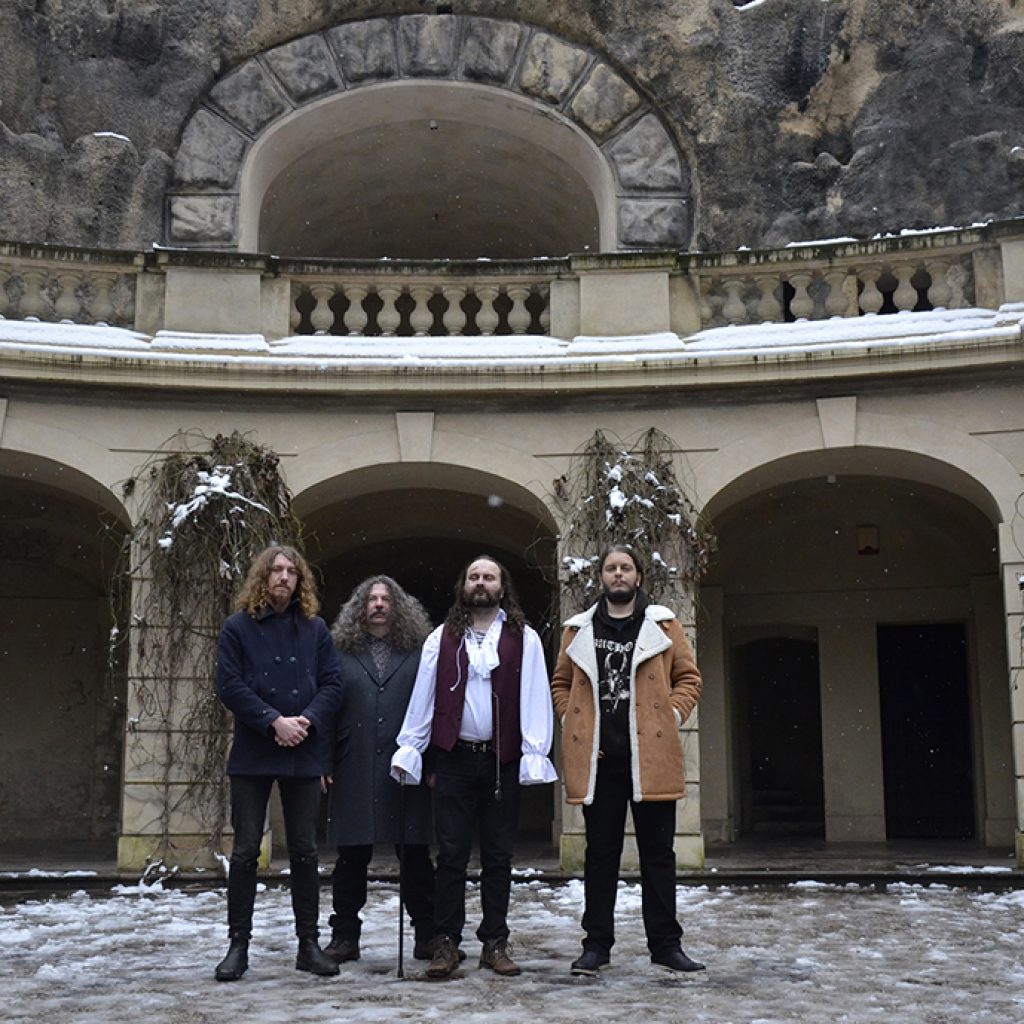
10) Although it is common in your discography the inclusion of several atmospheric passages, for the first time you have decided to incorporate two hypnotic instrumentals, especially ‘Panstvosalamandrovjest v kavernáchzeme’, where synths acquires a tonality close to seventies psychedelic rock.
In case of the introduction song in the beginning of the album, that was not something planned. Our new drummer Axel had these demo songs which he made for an unrealized project inspired by music from 70s Italian giallo movies. I really liked some of them, so I asked him to re-record a minute sequence from one of those to serve as a start of the album. He made all of that by himself, except our bass player adding bass there. You should think of the song as opening credits of a movie. Vintage horror films often started with this sort of joyful, optimistic music before they go darker. That was exactly the idea with the dramaturgy of songs on Vertumnus Caesar. When it comes to the longer instrumental song, that one is a tribute to the alchemist Michael Maier – the songtitle itself is a quote from his work. I wanted to create a truly magickal atmosphere for it and was, among other things, inspired by Florian Fricke and his wonderful Popol Vuh. This was later much enhanced by the session players – The Templar (on synths) and The Sorceress (on flute) from Hands of Orlac. Being Italians, they are huge fans of horror rock like Goblin or Black Hole, so they added a very important mystical feeling to the song as well, with even some Jethro Tull vibes at the end.
11) An instrumental song in the middle of the album, which introduces us to a darker second half. How important is the order of the songs and how do you work on that?
Extremely important, to the point of unhealthily obsessing over the perfect song order. I wanted the mood of the album to follow the course of Emperor Rudolf’s life – so the earlier songs dealing with his younger days are very energetic, vital and almost joyful, and then the further you go, the album becomes increasingly melancholic and dark. By the last tones of the mellotron closing the record, one should be picturing his funeral in the crypt of Saint Vitus Cathedral. It also heralds the dark times approaching after his demise – the horrors of Thirty Years War being just around the corner so to speak.
12) We would like you to tell us what the cover of your album represents. How did you find the work of the Swedish artist Astrid Bergdahl, who has been in charge of its design?
It’s a look into Emperor Rudolf’s hidden chambers, or more symbolically a look into his inner world. When you hold the album cover you are as if looking through his perspective, it’s a private scene hidden away in the castle. This is symbolized by various alchemical and astronomical tools present there, as long as some pieces from his famous Kunstkammer collection. More symbolism is present around, where you can see the Spanish mountain of Montserrat in the upper part (where he spent his formative days of youth) and also an outline of the Golem. I got in touch with Astrid through our drummer and was fascinated by her rather unique style that is influenced, among other things, by Art Nouveau and the Preraphaelite movement which are some of my all time favourite lines of visual art. I think her paintings have a sort of obscure, eerie hermetic atmosphere which was in perfect harmony with the overall themes and vibe of the album. It was also interesting working with someone who isn’t yet an overused artist in the metal world as she mostly works in other spheres, having previously just done a video for Tribulation when it comes to her metal collaborations. I sent her the lyrics and a lot of visual and verbal cues how I’d prefer the album cover to look like and then left all the rest to her own fantasy. It was a loose concept visually, so what you see are mostly her own ideas. I think it helped giving the album a bit of a 70s atmosphere I was aiming for, rather than using any commonplace metal clichés in it. Not that there’s anything wrong with those, but I always prefer doing things a bit different.
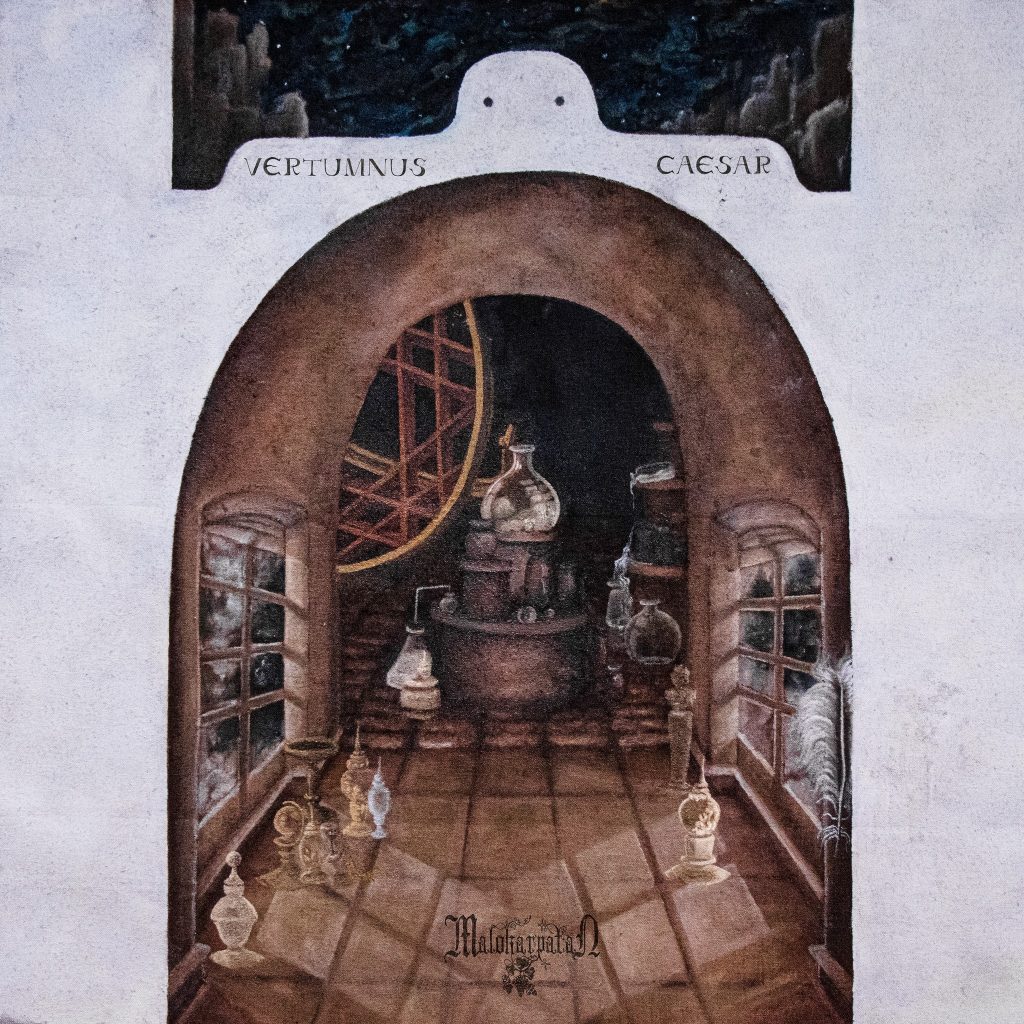
13) Something that helps to immerse in your musical proposal is the adequate production. Don’t you think there is a tendency, especially within extreme metal like thrash or black, to pursue a too modern sound in the releases? To give an example, I think you lose part of the charm of gems like Tormentor’s ‘Anno Domini’ or Sigh’s ‘Scorn Defeat’.
Absolutely and in fact Vertumnus Caesar is our most polished sounding album, it surely won’t go any clearer than that. I like each album having its own unique production, for which reason I always work with someone different on the mix. This time it was Olof Wikstrand of Enforcer fame, whom I approached because I thought he would give the album a strong heavy metal backbone, to hold all the different influences together like a glue. He did exactly that and his production makes all the different instruments shine in the mix. Next time we’ll once again go for something different, as I don’t like making the same album twice. We just needed all the different instruments to be heard clearly in the mix, hence the cleaner sound this time around. When it comes to the general metal scene, sadly there is a predominance of overly polished productions with Pro Tools and all kinds of abominations that make the music sound lifeless and artificial. I’d say it’s a little better now compared to the absolutely awful 2000s decade, because ”soulful” production became a bit more popular again at least within more underground circles. A part of why everything sounds so predictable these days is also that metal engineering became a professional thing. Back in the old days, a lot of the cult albums were mixed by people who had zero experience with metal music, which helped to bring unique elements into the sound. In art a lot of the best things happen by accident.
14) In what you do there is a lot of the past. The focus revolves around that, why? Is there no revolution anymore?
That’s just me following my own nature. I care very little about any modern movies, music, books, art… I believe in a cyclical existence – I think currently we are in one of those phases of cultural decay when no new interesting ideas come up anymore. I believe the 90s were the last time there was anything revolutionary happening in music and that’s not even my favourite decade. That being said, as I believe these things go in eternal cycles, it’s a question of time when something exciting will rise again. But it’s a complex issue that goes much deeper and I wouldn’t want to tire the readers with a wall-of-text personal analysis of that. Metal music reached its furthest extremes with bands like Portal or Sunn O))), when it comes to extremes in speed or brutality, that was reached already before in the 90s. My solution to the originality problem is combining different elements of the past in order to come up with something fresh. It won’t ever be as revolutionary as Jimi Hendrix in the 60s or Venom creating extreme metal in the early 80s, but it’s at least a healthier and more interesting path than being one of those ”worship bands”.
15) There is something medieval, or pre-Christian too, is it a form of escapism? Does this longing for the past apply to you as people and your ideas, or is it just art and does it apply to music?
That’s an individual thing because we are all a bit different people in the band and we don’t necessarily agree on everything. So it just reflects me as the primary song/lyric writer, with the other members being comfortable enough in those themes. I feel very alienated in our current world and try to stay away from many of its aspects, but I also realize what time and place I live in and am at peace with that. The idea of a more pastoral, pre-industrial world is close to my heart but of course being born in the 20th century, I doubt I would be very apt at surviving in such conditions. So I just try to combine the more comfortable elements of both worlds. Spending as little time as possible in the social aspects of the urban jungle, just sticking to closer friends and walking through nature, historical sites and so on. I spend a lot of time alone immersing in my interests. I also have spiritual beliefs, which are among other things also rooted in pre-Christian ideas but I don’t really belong to any specific branch – I dislike crowded places even when it comes to spirituality haha. What I find interesting enough to share with the world is usually always present in the lyrics.
16) Finally, we would like to know if you have scheduled concerts in Europe this year, maybe near Spain? Surely your live show must be a magical experience!
No, we won’t be doing any live gigs whatsoever for this album. The reasons are logistical – it’s just way too complicated to accurately perform all of that in only four people. There’s a lot of extra arrangements on many different instruments, which we’d be forced to just play through samples and that feels too much like cheating the concert visitor. Being an introverted person, I in fact enjoy this long break from live playing. My plan so far is to return to live gigs by the time we make another album in 2-3 years. I’ll just have to make it a bit more simplistic in arrangements, so we can play it live without too many complications. We’ve played live in Spain in… I think it was early 2019, in Barcelona. We’ve had an offer to return to your country so I’d say it’s quite likely we’ll revisit in the future once we start doing gigs again, but people will still have to wait a few years. See you by then hopefully and thanks for the interview, greetings to Spain!

